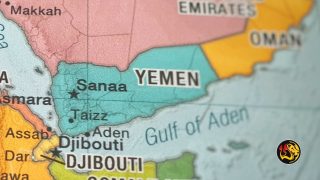
by Emmitt Barry, Worthy News Correspondent
(Worthy News) – After weeks of continuous attacks on commercial shipping in the Red Sea, coalition forces, led by the U.S. and the U.K., initiated major retaliatory strikes against Iranian-backed Houthi rebels in Yemen on Thursday. This operation, marking the first significant counteroffensive against the Houthis, was also supported by coalition partners from Australia, Canada, the Netherlands, and Bahrain.
Employing Tomahawk missiles launched from warships and fighter jets, the American and British militaries are reported to have targeted at least a dozen Houthi sites. These included logistical centers, air defense systems, and weapons storage facilities.
President Biden announced that he authorized the strikes to safeguard “one of the world’s most crucial waterways,” which had become increasingly perilous due to frequent drone and missile attacks by the Houthis. He confirmed that Australia, Bahrain, Canada, and the Netherlands backed the U.S.-British-led operation.
“These targeted strikes are a clear message that the United States and our partners will not tolerate attacks on our personnel or allow hostile actors to imperil freedom of navigation in one of the world’s most critical commercial routes,” Biden said. “I will not hesitate to direct further measures to protect our people and the free flow of international commerce as necessary.”
British Prime Minister Rishi Sunak echoed President Biden’s actions and, in a statement, strongly condemned the Houthi attacks for their destabilizing effect, confirming the involvement of British fighter jets in Thursday’s strikes. He stated, “Their reckless actions are risking lives at sea and exacerbating the humanitarian crisis in Yemen. This cannot stand.”
On Thursday evening, a high-ranking official from the administration stated that the strikes were precisely aimed at Houthi missile, radar, and UAV facilities. The objective was to disrupt and diminish their capacity to jeopardize global trade and the freedom of navigation along the crucial shipping route.
Over 40 countries joined forces in condemning the threats posed by the Houthis. Additionally, on January 3, a coalition of 13 allies and partners issued a warning, clearly outlining the repercussions should the Houthi attacks continue.
On January 10, the United Nations Security Council adopted a resolution calling for an immediate halt to Houthi attacks on merchant and commercial ships. However, shortly after this resolution, the leader of the Houthis pledged to escalate their attacks on vessels in the Red Sea, Bab El-Mandab, and the Gulf of Aden.
Analysts have cautioned that the intense series of air and naval strikes by British and American forces against the Iranian-backed Houthis in Yemen aimed at deterring threats; however, cautioned that this attack by coalition forces could potentially spark a wider regional conflict.
Copyright 1999-2026 Worthy News. This article was originally published on Worthy News and was reproduced with permission.
Latest News from Worthy News
The Trump administration has finalized a sweeping reciprocal trade agreement with Taiwan, confirming a 15 percent U.S. tariff rate on Taiwanese imports while securing broad new market access and purchase commitments for American goods.
Democrats are applauding White House border czar Tom Homan’s Thursday announcement that immigration enforcement operation in Minnesota will end next week.
Democrats in the U.S. Senate tanked the Homeland Security full-year funding bill in a last-ditch vote Thursday, all but guaranteeing a partial government shutdown starting Saturday.
Mourners in a remote Canadian town grappled Thursday with the aftermath of one of the country’s deadliest school shootings in decades, as families, survivors and leaders reacted to the tragedy that left eight victims — most of them children — dead, along with the 18-year-old suspect.
A gunman who opened fire at a school in southern Thailand’s Hat Yai city on Wednesday wounded a teacher and a student before being detained, authorities said, in a rare attack that sent students and staff into panic.
The Republican-led House of Representatives has passed the Safeguard American Voter Eligibility (SAVE) America Act, advancing legislation that would require proof of citizenship to register to vote and photo identification at the polls. The bill now heads to the Senate, where its future remains uncertain amid strong Democratic opposition.
Israel’s Ministry of Defense announced on Wednesday that its advanced David’s Sling air and missile defense system has completed a series of complex modernized tests, a development officials say bolsters the country’s defensive posture as tensions with Iran escalate and the United States prepares military options that could include direct strikes.







